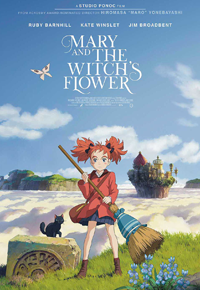 Well, this all started with an unofficial Ghibli film, so I suppose it's only right that it ends with one as well. This one was actually done by Studio Ponoc - A company founded by former Studio Ghibli lead film producer Yoshiaki Nishimura. This represents the first film to be released by the studio. It appears to be the direction things have gone. This one introduces us to a young, clumsy girl named Mary (Hana Sugisaki/Ruby Barnhill) who, one day, comes across a mysterious glowing flower. The flower appears to grant her the powers of an average witch, which is discovered mainly when a large broom takes her to a sort of city in the sky in which lies a magic college where witches and wizards train to become good - sound familiar? Anyway, a lie about who and what Mary is (a human being using the flower for her magical powers, instead of an actual witch), told to the headmistress, Madam Mumblechook (Yūki Amami/Kate Winslet), lands her in a spot of trouble. She soon finds herself having to use her newfound abilities to rescue someone she cares about. As one may imagine from my overall description, I found that this was actually a weaker title, despite a lot of otherwise cool stuff that goes on within the film. For the most part, this is due to the overall seemingly borrowing nature of the film. If I was to describe it as a combination of things in a blender, it's 'Kiki', 'Harry Potter' and perhaps a bit of 'Wizard of Oz' all thrown together. That said, it's also based on a children's book called 'The Little Broomstick', which is a 1971 book, and thus predating a lot of the more modern stuff mentioned. I know I said 'Oz', but that's kinda the least of it anyway. In fact, I daresay 'Harry Potter' may have taken more from that original book - but what do I know? This is a pretty recent one that not everyone has seen yet, so I have to admit it feels kinda good being ahead of all of this, finally. It's not every day I can mention seeing a Ghibli film that most Ghibli fans still haven't yet. But I almost wonder if this further represents the ending of something kinda spectacular with this new studio. Or at least, I wonder if that's why fans kinda frown on this one. Personally, I'd say it's the stronger end of a 3 (yes, again, but that's just how it is). I've certainly seen worse. Anyway, this is the final review for my month of Ghibli film watching, and I have to admit that I had a wonderful time with all of this - the good, the bad, the strange, it was all enjoyable. I learned a thing or two about Japanese culture and traditions, and I learned that I'm actually a fan of anime, which I tended to almost turn my nose up at before all of this. I'm happy to say that my eyes are open to things now, and I fully get how people are so passionate about it. 3/5
0 Comments
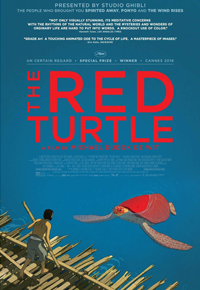 Here we have around the time Ghibli starts to slip a bit. In which particular way, I'm not entirely sure, but here we see Ghibli teamed up with a studio called Wild Bunch, and the following film isn't actually a Ghibli production at all - but more on that with that particular review. This is the last of the Ghibli collection to earn an Oscar nomination, this time around losing it to 'Zootopia', which was almost certainly the better film of the two. 'The Red Turtle' was something that struck me as so incredibly basic that it could have potentially done better as an animated short. The basic 100% non-speaking plot involves an unnamed man, getting shipwrecked on an island that is luckily abundantly full of resources. When trying to escape, this big, red turtle keeps getting in his way. For revenge, he just about kills the turtle, but then the turtle turns into a woman, and the rest of the movie is them growing and raising a son together. Yeah, it's probably the strangest of the collection altogether. That is saying a LOT when it comes to Ghibli studios, too. It's only the second to last film on the list, but I have to find this one kinda near the bottom of things. It's not quite like sitting through something like 'Ocean Waves', as there's still some neat stuff here, but it does remain a bit boring at time, along with a bit of "what the hell did I just watch?" Seriously, I dunno if this turtle-turned-girl is supposed to be some kind of symbolism for loving mother nature or something, but this was one of the more confusing titles on the list for me. I know this is probably the shortest review I've written yet on a Ghibli film, but there's just nothing for me to talk about here. It's neat that it's a different type of animation like 'Yamadas' or 'Kaguya', and it is a very beautiful film to look at, but all in all I have to say I found this one to be entirely overrated. I guess a lot of it is to portray family in a sort of unique way, but in the end, this one just didn't do much for me. Once again, it's a 3, but on the lower end of it. 3/5 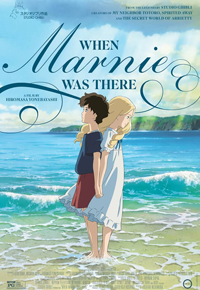 Here's another Ghibli title that went up for a Best Animated Picture Oscar, this time losing to the likes of 'Inside Out' (which, in my humble opinion, was frankly the better film anyway, this time around). But, as usual, that's not to say that this was a bad film at all. Speaking for myself, it just kinda ends up in that all around forgettable category. This time around, we're introduced to a preteen girl named Anna Sasaki (Sara Takatsuki/Hailee Steinfeld) who is going through all sorts of horrible depression, as well as suffering from bad asthma. She's therefore sent to the countryside to live with her Auntie in the fresh ocean air. While still going through her personal problems, Anna meets and befriends a very sweet girl around the same age named Marnie (Kasumi Arimura/Kiernan Shipka). She manages to be the perfect friendship that Anna has been seeking this whole time, allowing her to open up like never before, however the catch is that Marnie may not even be real. This one, at least to me, covers the angst of what its like to get into that confusing stage known as puberty quite well. The only issue I have with it is that Anna is almost a little too angsty for the overall enjoyment of her character. She's relatable to those going through similar issues, but one has to admit there are moments that she just acts like a straight up ungrateful brat. The film otherwise looks quite lovely and has a fairly intriguing, if not relatively predictable storyline. However I found this time around that the characters lacked a bit more than usual. Our two mains are almost polarizing extremes to the point that they're almost unlikable. Anna is just stubborn and often irritating, but Marnie is sweet enough that she's almost a bit creepy. That said, perhaps that's kinda what they were going through here - an almost perfect Yin and Yang to make such a strong friendship. One might ask oneself if this movie has some leaning towards potential homosexuality with its undertones as well. There are moments that left me wondering if they were going for something that strong. I'd have to say that it's something one would have to judge for oneself though. To me, perhaps a little, but it's not about that so much as the bond formed as a whole between Anna and Marnie. It's perfectly decent for what it is, but it I have to admit that as someone who suffers from certain things, myself, including some depression, a lot of it kinda hits almost too close to home. That said, I CAN say that one could follow Marnie's example when it comes to dealing with people who have depression. The idea is that Marnie's there for her when she's needed (hence the title) no matter how brutal things get. It's sweet, but it can be a little hard to get through. 3/5 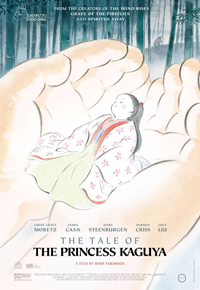 I have to say, right off the bat, this is the type of movie I was truly hoping to see while going through these Ghibli titles. This is something that delves into Japanese culture and traditions, being based on a Japanese folktale, 'The Tale of the Bamboo Cutter', in which a mysterious baby girl is found inside the stalk of a glowing bamboo plant. The bamboo cutter, Miyatsuko (Takeo Chii/James Caan) and his wife (Nobuko Miyamoto/Mary Steenburgen) who found her eventually have her named Kaguya (Aki Asakura/Chloë Grace Moretz) and raise her as royalty. As one may imagine, the rest of it has to do with the pressures of an otherwise free-spirited girl being raised in such a way. The whole thing is really quite real and depressing, but it's very well done. You know, like 'Grave of the Fireflies' but a bit less morbid. Perhaps what is to be appreciated most as a takeaway from this has to do with men being blind to beauty. You see, a large part of this movie consists of several suiters of noble standing attempting to win the affections of Kaguya. I won't say how its done, because it's actually quite interesting what Kaguya comes up with for their challenge. There is usually something to be said about the strong female leads in the Ghibli films, and this one is no exception. Yes, she's pretty strong-willed, but most of the strength of her character comes from how fleshed out she is. She's forced into this seemingly traditional princess role against her will, and it's not like some Disney romantic comedy. All in all, it actually gets quite harsh, and we totally end up feeling for her and empathizing with how difficult the situation must be. What 'The Wind Rises' pulled the trigger on for a few years ends up continuing with this title as well; that being the Oscar nomination. However, this time around the winner was 'Big Hero 6'. I'd be lying if I said I was disappointed in the end result, but I have to admit that this film may have been more deserving altogether. It's not everyday we get introduced to something as seemingly culturally significant as this, and it loses to another superhero movie. I LOVE 'Big Hero 6' and I'm saying that. At the end of the day, this is definitely one of the more emotionally powered Ghibli films, and that's something I always appreciate. If it can manage to make me say "woah" at least once, I'm pretty satisfied with its emotional pull. And unlike 'Fireflies', this is one I may very well want to revisit in the future. 'Fireflies' was great and all, but it's up there with 'Schindler's List' for devastation. This was more a sad, yet hauntingly beautiful film - especially when you take into account its soundtrack and seemingly traditional, 2D animation. For my money, THE Ghibli film anyone interested in Japanese lore should check out. 5/5 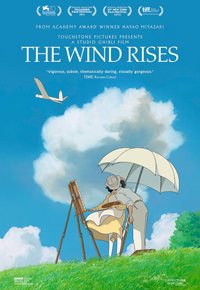 Taking a giant step away from anything that Gjibli would usually put out there, here is something of a biographical pic, covering the life of Jiro Horikoshi; the chief engineer of several Japanese fighter plan designs during World War II, most notably, the Mitsubishi A6M Zero fighter. The film opens, showing him as a kid, dreaming about another Italian aircraft designer named Giovanni Battista Caproni (Nomura Mansai/Stanley Tucci), who seems to be a sort of spirit guide for Jiro (Hideaki Anno/Joseph Gordon-Levitt). Due to Jiro's eyesight, he knows he may never be able to pilot a plane, but he does wish to design them. The problem is, Jiro finds himself designing these fighter planes throughout World War II, while his real dream is just to create something beautiful. A lot of the story has to do with the struggling conrtast between his talents and what the government needs from him. Meanwhile, mush as the movie poster dictates, there's also a fictional love story going on here, involving a woman named Nahoko Satomi (Miori Takimoto/Emily Blunt). Knowing my more recent reviews, you're probably already rolling your eyes at me going "and what's wrong with this one?" The only real answer I can give as to there being anything "wrong" with it, is that it appears to be entirely fictional when the film otherwise tells of Jiro's career in aircraft design quite well (at least according to what my homework on the film suggests). However, with a film's subject-matter as heavy as it is, the love story - or at least A love story of sorts seems to be in order. I think in many ways it was mainly thrown in to create more of a humanistic character, and to illustrate how much he cared about life, rather than just profile him as a creator of war planes. This was the third Ghibli film to be nominated for an Oscar, respectively following 'Spirited Away' and 'Howl's Moving Castle'. Sadly, this was also the year that 'Frozen' got its icy clutches on that award, and we've been hearing 'Let it Go' ever since. I daresay, if that film wasn't out that year, this could have easily claimed that award - if only for the original idea of doing a semi-biographical picture which, much like with 'Grave of the Fireflies', shows up a Japanese perspective during war times; something we must admit that we tend to turn our backs to as North Americans. Once again, I would urge people to at least give this one a look, if only to gain another perspective on things. However, I wouldn't say it's more important than 'Fireflies'. This may lean more toward true story territory, but 'Fireflies' really bluntly illustrated the devastation left behind by the Americans that we tend to turn a blind eye to. This one, while it does have a sadness to it, that sadness wears off when you find out that our female lead was most likely fictitious. I've looked for the name, but only this animated character ever shows up. As far as Jiro's love life in reality, I have nothing really showing me what's what about it. Anyway, the fictitious aspects of this film set aside, it still remains an interesting movie on the whole. Again, if nothing else, it shows us a new perspective on things, and the fact that its pretty much Ghibli's one and only real biopic sets it aside from everything else the studio has put out, making it far more unique. It's worth checking out, but I'm not sure it'll top my list. Of the more or less straight up love stories thus far, however, I'd have to say this was the more enjoyable of them, even if it is fictitious. Most of the positive rating here comes from the other, more real parts of the story. 4/5 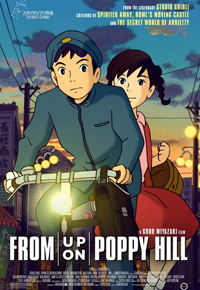 I guess it was only a matter of time before something like this came up again, in which I consider it to be one of Ghibli's "lesser" films. As usual, not necessarily bad, but just an odd and awkward subject matter that I'd sooner avoid to see one of the studio's stronger films instead. That said, I'll give the film credit for tackling the subject matter in a positive way, without it getting too out of hand. Long story short, we meet a couple of high school students named Umi Matsuzaki (Masami Nagasawa/Sarah Bolger) and Shun Kazama (Junichi Okada/Anton Yelchin). Umi's mother, Ryoko (Jun Fubuki/Jamie Lee Curtis) has gone to study abroad as Umi is left to take care of her sisters and grandmother while also attending school, and Shun works for the school newspaper, and is a bit of a showoff. The two develop a liking for each other, however they both soon find out that they have just a bit more in common than they originally thought. Meanwhile, the other side of the story involves the classic "save the rec center" plot, involving a group of high school club members attempting to save their school's clubhouse from being taken down to make way for the 1964 Olympics. It's another title that strays away from fantasy and grounds itself in reality, which is fine, but I personally find Ghibli's fantasy films to be far superior. I mean, to each their own, but I personally find these love stories a bit yawn-inducing. That said, credit to the studio for changing it up once in a while. While this may not be up my alley, it's perfectly fine for others who enjoy the "realistic slice of life" concept rather than the "epic fantasy adventure" concept. Thus far, the only realistic one I've really liked was 'Grave of the Fireflies', and that was mostly for the view into Japan, immediately post-World War II. It was a story about a struggle for survival, and often difficult to watch, yet captivating all at once. Most of the realism in these films afterward tend to be love stories executed in different ways, which generally aren't up my alley, unless they can be done in a fantastic way. But these are just kinda plain and simple. Again, that's fine for many, and I can see people enjoying them, but all they do is make me look more forward to the next fun fantasy adventure. Anyway, I find this one landing in the same area as 'Only Yesterday', 'Ocean Waves', and to a lesser extent, 'Whisper of the Heart'. It's not gonna find itself on my final Top 10 list, but it's something to check out if you feel like something more simplistic and realistic. Again though, it touches on a subject matter that may be a bit awkward for some, so just keep that in mind going into it. Once again, it's a 3, but the lower end of it. 3/5 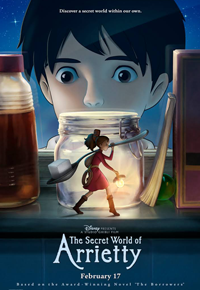 Here we have a title based on a book called 'The Borrowers', which tells the story of little people who dwell within the walls of a house, and take that which they need from the humans in small doses. For example, tissues and sugar cubes - things humans wouldn't notice go missing. This is pretty much just the Ghibli take on it, but it should probably be known that I'm mostly unfamiliar with 'The Borrowers', other than its core concept. The story opens up with a narration from the human boy, Shō (Ryunosuke Kamiki/Tom Holland/David Henrie), telling of a week of summer spent with his great Aunt, Sadaku (Keiko Takeshita/Phyllida Law/Gracie Poletti) where, basically, he becomes familiar with the idea of the Borrowers by witnessing them first-hand. Shō attempts to befriend Arrietty (Mirai Shida/Saoirse Ronan/Bridgit Mendler), the daughter of the family, after catching her on her first borrowing mission with her father, Pod (Tomokazu/MiuraMark Strong/Will Arnett). However, Pod and her mother, Homily (Shinobu Otake/Olivia Colman/Amy Poehler) remain cautious of the potential dangers of human contact, and begin to wonder if they should relocate. Meanwhile, Arrietty attempts to find the good in mankind, through Shō. Of all the films that Studio Ghibli has cranked out, this was the only one I actually recall seeing trailers for, and nearly even getting to see in the theater. This is a most unfortunate miss on my part, however, seeing as the overall scale of this movie would have lent itself to the big screen very nicely. It's stylized in such a way that we understand how small these characters really are through, not only visuals, but the way the sound is mixed and edited. It's very interesting that this animated film seemed to do a better job than something like 'Honey, I Shrunk the Kids'. It's eerily beautiful in its execution. The underlying theme in this one seems to be another one about environment, but having to do more with endangered species than just nature in general. The big thing in this is the idea that the Borrowers are just about extinct, as the family has no idea how many of them there are left, and understand that they're rare, in the very least. The message is clear but subtle enough that it's mostly shadowed by the film's... how many times can I bring this up... beautiful animation and scenery. However, I give this film full credit for giving us something different from our usual vast, breathtaking landscapes. This one does a fantastic job of bringing us into their little world instead, and this time around, I found it to be a bit more hauntingly beautiful than usual. I really liked it as a whole, and if it ever does come to the big screen again, I'm gonna have to try to get myself a ticket. 5/5 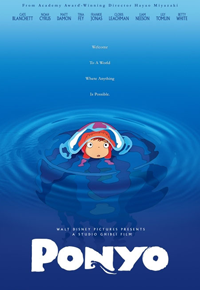 After a movie as dark as 'Tales from Earthsea', Ghibli studio once again finds the perfect balance with this lovely and cute, heartwarming tale, good for the whole family. Indeed, it's still one of Miyazaki more popular films, and it's probably the flip of the coin for overall cuteness, having 'Totoro' on the other side of things. The film opens with a once-human wizard named Fujimoto (George Tokoro/Liam Neeson) who now dwells underwater with his daughters, including one named Brunhilde, who seems to be bigger and a bit more advanced that the others. She decides to sneak off on the back of a jellyfish, only to surface trapped in a jar, found by a little boy named Sōsuke (Hiroki Doi as Sōsuke/Frankie Jonas) who names her Ponyo. It's soon discovered that Ponyo isn't like any other fish, enjoys the hell out of ham, and aftre tasting human blood (through a cut on Sōsuke's finger that she licks) tries to become human. Meanwhile, her father searches for her, desperately, causing tsunamis and other storms in the process. However, it is discovered that Ponyo has actually fallen in love with Sōsuke. Soon, Sōsuke is tested for his love, as if he doesn't love her in the same way, Ponyo will revert from being a human into, not a fish again, but sea foam. Meanwhile, we also have Sōsuke's mother, Lisa (Tomoko Yamaguchi/Tina Fey) helping out where she can, but one has to wonder at what cost. Seriously, watching her try to be a mother can be upsetting at times as she seems to wanna risk her own son's life just to try to go places. I mean, I guess it's supposed to be humorous as we're seeing this woman who just won't take any shit from anyone or anything, including mother nature, but at times it feels extreme. Just watch her drive, and you'll know what I'm talking about. I know a lot of people love this character, but I can't say I did. Her love and understanding of her son is there, which is nice, but if you saw this person in reality, you'd probably be questioning her mothering methods. Luckily, however, this movie doesn't revolve around her so much as the relationship between Sōsuke and Ponyo. And I have to admit to fully appreciateing Sōsuke's character, as he actually reminds me a bit of myself at a young age. He likes to explore where he's allowed to, likes to show off cool stuff he finds to people who will appreciate it, and there's just a lot of love in his heart as he's not only a good listener, but will go out of his way to help out who he loves as well. He's probably a bit more charming than I was back then, but still, pretty close. To me, this ends up mostly being a film about the contrast between puppy love (the love between two kids) and the convoluted responsibility that comes with taking care of someone you love. Interestingly enough, it does seem to work both ways here as well. We really see how much the two care for each other, and it's extra cute considering that they're both just children. All in all, I'd consider this to be one of Ghibli's best feel-good movies. It carries with it a cuteness, a sense of humour, and it really just doesn't get dark. Even 'Totoro' had the story of the sick mother, but this one, at worst, covers the fact that the father isn't really able to be around for Lisa and Sōsuke due to his job. So if you need a pick-me-up from a depressing day, I have to admit that despite a few of my nitpicks, this is a great place to start. It put a smile on my face, anyway. 4/5 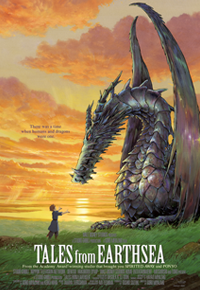 This seems to be the title that reaches the very bottom on any sort of Top Ghibli film list. And I have to admit, though I really didn't dislike this title all that much, I can see where people are coming from. The overall execution of things here is somewhat confusing and lacking in some explanation. It's another one of those Ghibli films where the animation is the big star, because that part of it is pretty damned amazing. The film opens up as we see some sailors witnessing the strange occurrence of two dragons fighting each other. This basically translates to something being terribly wrong in the world, and things are clashing. We learn that mankind has taken to the Earth and water, prizing their possessions, where the dragons find freedom with the elements of fire and air. The separation of dragons and men seem to be what is putting the world off-balance. In what is probably the single most unexplained and random scene of any Ghibli movie, the young Prince Arren (Junichi Okada/Matt Levin) fatally stabs his father, the King of Elad, and flees with his sword. It's even revisited later on, but even he can only say "I dunno why I did that". We do get that he has an incredibly bad temper, however, so maybe the King just wanted him to tidy up his room when he didn't want to or something. Anyway, Arren finds himself on the run, and he runs into the Archmage Sparrowhawk (Bunta Sugawara/Timothy Dalton). Together, they set out on a seemingly random journey to try to find out what's going on in the world. We soon learn that a lot of the trouble is being caused by another dark wizard named Cob (Yūko Tanaka/Willem Dafoe) who seeks to keep eternal life by any means necessary. I personally just found this story to be a bit convoluted and confusing for the most part, so it didn't exactly end up being a favourite in the collection. That said, there's enough to appreciate here as far as certain things go. Again, the animation here, especially in the scenery, is some of the best I've seen yet. On top of that, the lessons to be taken away about how death is an unfourtunate inevitability is something that can hit home for basically everyone - something I appreciated, to be sure, but it's such a basic life lesson that I can see why this film didn't exactly do well. For my money, it's actually one of Ghibli's weaker films, and it's not something I'll rush to revisit any time soon. That said, I seem to know more people who like it rather than dislike it, so who knows if there was something I missed along the way. I'll let the positives of the film grant it a solid 3, but I have to admit that for me, it's the lower end of that ranking. At least it didn't feel like any sort of direct copy of anything else, kept some originality and told a decent cautionary tale. I'll also give it some of the more horrific imagery to be seen in a Ghibli film, which is almost a breath of fresh air. But all in all... meh. 3/5 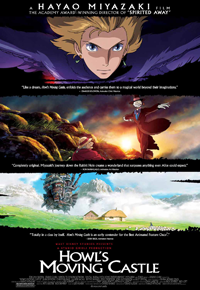 Being another revisit on this Ghibli marathon, this was a title I knew I really liked, already. It probably ended up being my favourite of the few Miyazaki films I watched a few years ago, and I still feel pretty much the same nowadays. Interestingly enough, it just carries with it this sort of perfect combination of darkness and family fun. We meet a young girl named Sophie Hatter (Chieko Baisho/Emily Mortimer) who has a run-in with a dashing wizard named Howl (Takuya Kimura/Christian Bale), who rescues her from a couple of henchmen who work fo the Witch of the Waste (Akihiro Miwa/Lauren Bacall). Unbeknownst to Sophie, the witch uses magic to stay young, and in finding this out, Howl had previously left her. This put a curse on Howl, and a further curse is placed on Sophie out of jealousy for his attention. The curse in question transforms her into a 90-year-old woman. In order to find a cure, she heads through the countryside. She meets a living scarecrow who she names "Turnip Head" who leads her to Howl's moving castle, where she claims she has been hired to be the place's new caretaker, in order to have a place to stay. Here, she also meets the likes of a fire demon named Calcifer (Tatsuya Gashūin/Billy Crystal) and Howl's young apprentice, Markl (Ryūnosuke Kamiki/Josh Hutcherson) and may very well have accidentally stumbled on a whole new family of sorts. Along with her new old age comes the mind of an older woman as well, which has her appreciate life much more than she did when she was still normal. It sounds pretty damn convoluted, I suppose, but it's one of those stories where the central plot kinda unfolds as it goes, and I could find myself heading into spoiler territory if I continue to unveil the story. I think the important thing to take away from this is the life lesson that things just aren't as bad as they seem, and could always be worse. The lesson is drilled into us by Sophie's elderly character (by the way, voiced by Jean Simmonds) as she sort of carries her curse around with her the whole time, all the while talking to other characters as though she's the wise old grandmother with plenty of life experience. I think what's to be appreciated here most of all are those lessons. Where one character will mope or be upset about something, Sophie will be there to tell them how they're being silly and will get over it soon enough. Hell, she even applies this logic to the witch who cursed her at some points. All in all, it's one of the stranger titles of the collection, but it's one of the Ghibli titles I'd recommend most people see, if only to learn a thing or two about how, again, things could always be worse. And furthermore, of things do get worse, they could still get even worse than that. There's also a sort of love story going on here, but it's pretty subtle, to me, and the more important aspects of the film surround it nicely without it being so in your face. As with most films in this collection, the overall animation and scenery, once again, provide a breathtaking look into a fantasy world. The interesting thing about this one, however, is that for the most part, the lessons to be taken away from it are very much grounded in reality. Almost anything from Sophie's mouth is something very real that can be easily applied to day-to-day life. And that's what makes this movie so damn good. It's the best of both worlds. Let's not forget about it's sense of humour as well, often shedding a light on otherwise dark situations. That was my takeaway, anyway. It'd be worth checking out a third time for me, I think, in case there was anything I missed. But it's a great flick. 5/5 |
AboutAs anime is an all-around untapped resource for my viewing pleasure, I have decided to explore the Ghibli titles, one-by-one. It seemed good a place to start as any. I'll be focusing on these titles throughout the month of August. ArchivesCategories
All
|
 RSS Feed
RSS Feed